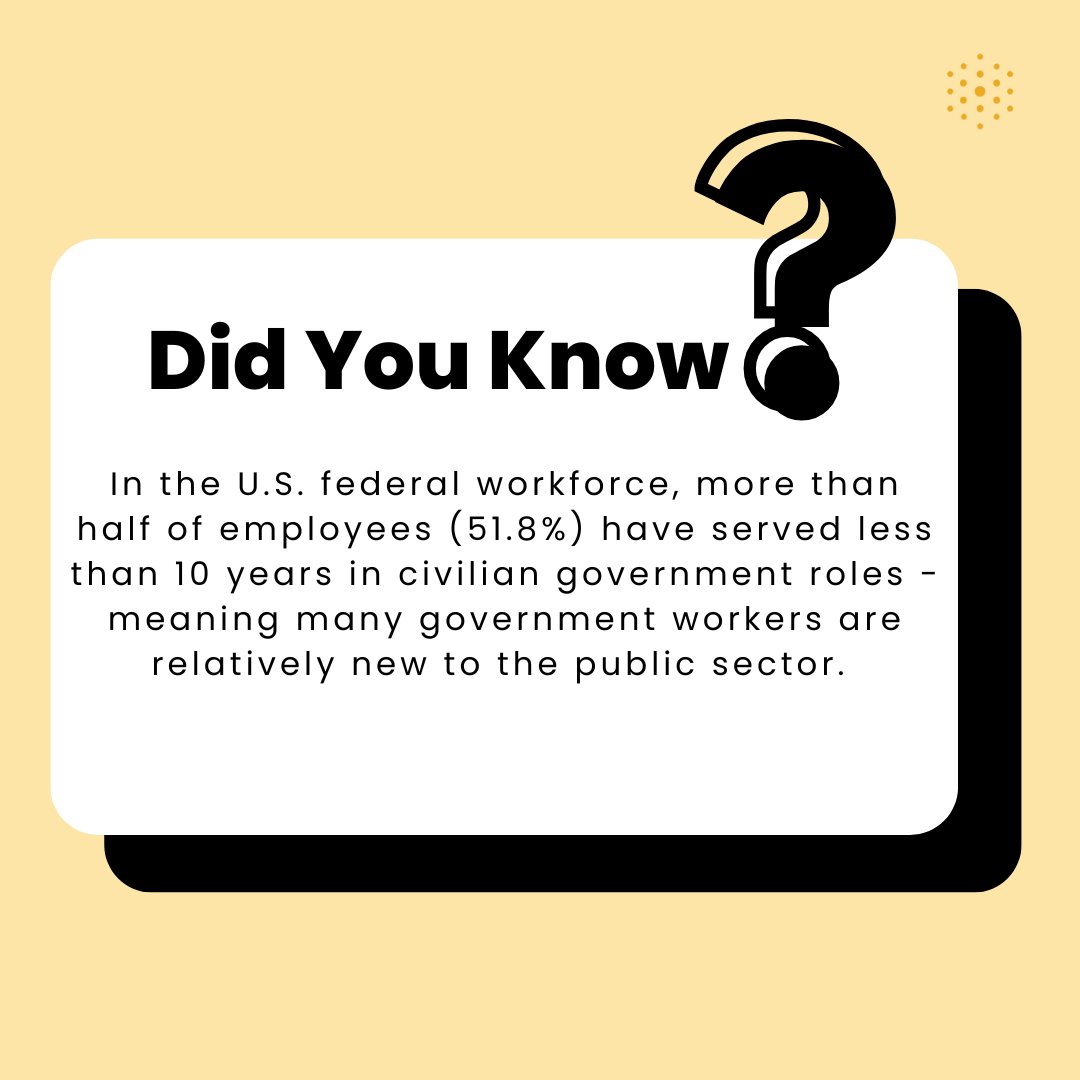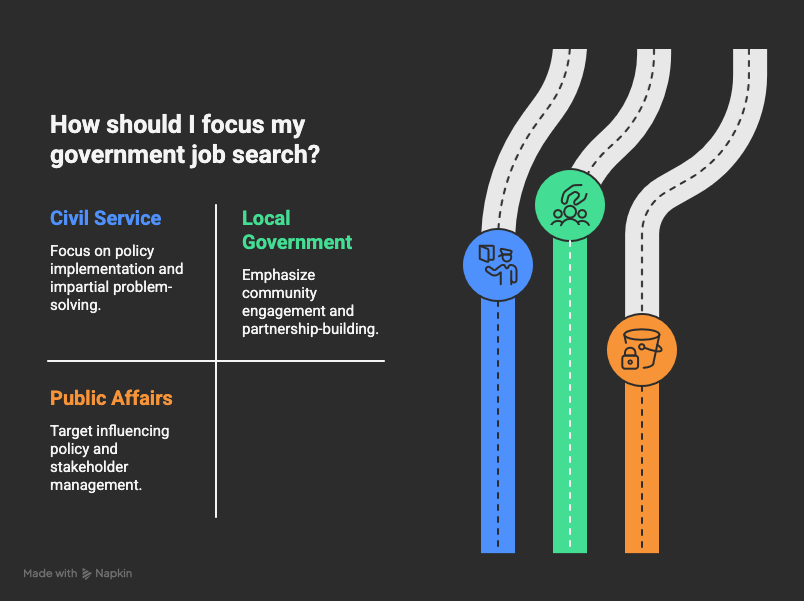How can you build a focused, successful career in the public sector?
Stop applying broadly and start strategically. Choose your target arena—Civil Service, Local Government, or Public Affairs—demonstrate political awareness, use evidence-driven applications, and continuously upskill to stay relevant in a dynamic, mission-driven field.
If your strategy is to apply for every government opening you see, you’re already setting yourself back.
According to the 2024 Public Sector Hiring Report, the public sector saw open positions drop by 2.3%, yet the number of applicants per job rose 20.5% - pushing many agencies to choose between too many applications and too few qualified ones.
That means each application you submit must be razor sharp to get hired.
The key is focus. You can’t treat “the government” as a single employer.
Instead, you need to target a specific arena - Civil Service, Local Government, or Public Affairs, and tailor your skills, achievements, and narrative to fit what that sector values.
Here’s how to refine your government job search and stand out where it matters most.
How Should I Focus My Government Job Search?
You need to stop applying broadly to "the government."
Instead, target a specific arena like the Civil Service (for policy implementation), Local Government (for community-facing roles), or Public Affairs (for influencing policy).
This focus allows you to tailor your skills and experience to the distinct culture and needs of each sector, dramatically increasing your chances of success.
The public sector isn't a monolith; it's a collection of distinct arenas, each with its own entry points.
As London School of Economics (LSE) points out, roles can range from the highly political to the strictly operational.
Picking your arena is the most critical first step.
For example, the Civil Service is the engine room of government, requiring impartial problem-solvers.
In contrast, Local Government is on the front lines, demanding skills in community engagement and partnership-building.
Why Is 'Political Sensitivity' So Important for Any Government Role?
Every public sector role operates within a political context.
Political sensitivity isn't about partisanship; it’s about understanding the priorities, public perceptions, and stakeholder pressures that shape your work.
This awareness is crucial for navigating challenges, securing resources, and making effective decisions, even in the most technical or administrative positions.
A study in the Public Administration Review found that the most effective public sector leaders were those who could "navigate the political landscape" to achieve their goals.
You can develop this skill by reading voraciously from diverse news sources, understanding the government's budget cycle to see its real priorities, and constantly practicing perspective-taking to understand the motivations of all stakeholders involved in a decision.
Also Read: How to write a cover letter for federal jobs?

How Do I Make My Government Job Application Stand Out?
You must treat your application like a legal brief, not a resume.
Government hiring is strictly merit-based, so you must provide concrete evidence for every required competency.
Deconstruct the job description, use the STAR (Situation, Task, Action, Result) method for every example, and quantify your achievements to prove your impact beyond a doubt.
A generic application will fail.
A survey by the recruitment firm Hays found that 41% of public sector hiring managers see a lack of specific, evidence-based examples as the biggest mistake candidates make.
Don't just say you "improved a process." Say you "developed a new workflow for processing invoices that reduced payment times by 15%."
Numbers provide powerful, undeniable proof of your capabilities. Your resume should be filled with such concrete achievements.
Is a Government Job Still a 'Job for Life'?
Not really. The old idea of a "job for life" is fading, and you should focus on "employability security" instead.
With the rise of short-term contracts and performance-based advancement, your goal is to constantly develop in-demand skills.
This ensures you remain a valuable and resilient asset across the entire public sector, not just in one role.
A 2024 trends report from the National League of Cities highlights a move toward skills-based hiring.
This means the pressure is on you to keep your skills current.
Build your employability by embracing data literacy (a key skill in any modern role), volunteering for cross-functional projects to expand your network and experience, and becoming the go-to person for new digital tools within your team.
How Should I Network for a Public Sector Job?
You should network to gather intelligence, not to ask for a job. The goal is to understand an agency's challenges, culture, and upcoming projects before you apply.
This insider information is gold dust for tailoring your application and preparing for your interview, giving you a significant advantage over other candidates.
Reach out to people in roles you find interesting for brief, 15-minute informational interviews to learn about their work.
Attend public events and webinars hosted by government agencies and think tanks.
This allows you to learn and make connections in a context of shared professional interest.

Final Thoughts
Breaking into government work requires more than persistence, it demands clarity, evidence, and focus.
From choosing the right arena to demonstrating political awareness, every step of your application needs to show you understand the unique expectations of public service.
If you’re ready to sharpen your resume, craft stronger applications, and build confidence for interviews, Hiration can support you with AI-driven guidance designed to help candidates stand out in competitive fields like the public sector.
With the right preparation and mindset, your next step toward a fulfilling government career is within reach.
Public Sector Career — FAQ
Why should I focus my government job search?
Because “the government” isn’t one employer. Targeting a specific arena—like Civil Service, Local Government, or Public Affairs—helps tailor your resume, examples, and skills to each sector’s unique culture and needs.
What makes political sensitivity essential in public sector roles?
Every role operates in a political context. Political sensitivity means understanding priorities, stakeholder pressures, and public perceptions—key to decision-making, collaboration, and effective leadership in government settings.
How can I make my government job application stand out?
Use evidence-based examples for every competency using the STAR (Situation, Task, Action, Result) method. Quantify results—show measurable impact rather than vague claims—to prove your effectiveness and credibility.
Are government jobs still considered “jobs for life”?
No. Modern public sector careers emphasize skill-based employability over lifetime tenure. Focus on continuous learning, cross-functional collaboration, and digital fluency to remain valuable across roles and agencies.
How should I network for a public sector career?
Network to learn, not to ask for jobs. Conduct informational interviews, attend public sector events, and engage with professionals to gain insider insights into an agency’s culture, challenges, and upcoming initiatives.
What are the biggest mistakes candidates make?
Applying generically, ignoring competency frameworks, and failing to provide measurable examples. Strong candidates treat their applications like evidence portfolios that directly map to each requirement in the posting.
How can I build long-term success in public service?
Adopt a mindset of clarity, credibility, and growth. Master communication, data literacy, and policy awareness while continually aligning your work with the public good to thrive across government domains.



